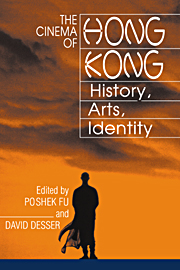Book contents
- Frontmatter
- Contents
- List of Contributors
- Acknowledgments
- Introduction
- Chronology of Hong Kong Cinema
- PART I HISTORY
- PART II ARTS
- PART III IDENTITY
- 9 Between Nationalism and Colonialism: Mainland Émigrés, Marginal Culture, and Hong Kong Cinema 1937–1941
- 10 Urban Cinema and the Cultural Identity of Hong Kong
- 11 Rewriting History: Hong Kong Nostalgia Cinema and Its Social Practice
- 12 Filming Diaspora and Identity: Hong Kong and 1997
- 13 Buying American, Consuming Hong Kong: Cultural Commerce, Fantasies of Identity, and the Cinema
- 14 Hong Kong Electric Shadows: A Selected Bibliography of Studies in English
- Index
11 - Rewriting History: Hong Kong Nostalgia Cinema and Its Social Practice
Published online by Cambridge University Press: 05 June 2012
- Frontmatter
- Contents
- List of Contributors
- Acknowledgments
- Introduction
- Chronology of Hong Kong Cinema
- PART I HISTORY
- PART II ARTS
- PART III IDENTITY
- 9 Between Nationalism and Colonialism: Mainland Émigrés, Marginal Culture, and Hong Kong Cinema 1937–1941
- 10 Urban Cinema and the Cultural Identity of Hong Kong
- 11 Rewriting History: Hong Kong Nostalgia Cinema and Its Social Practice
- 12 Filming Diaspora and Identity: Hong Kong and 1997
- 13 Buying American, Consuming Hong Kong: Cultural Commerce, Fantasies of Identity, and the Cinema
- 14 Hong Kong Electric Shadows: A Selected Bibliography of Studies in English
- Index
Summary
Hong Kong 1990: a place caught in postcolonial nostalgia, the simulacra of late capitalist technological advancement, the terror of Communist takeover in barely seven years, the continual influx of unwanted refugees, the continual outflow of prized citizens.
I begin this chapter by invoking Rey Chow's description of Hong Kong's social scene in the transitional period in order to explicate its situation of postcoloniality. Chow's statement, to a certain extent, brings out the political as well as the social dimensions of Hong Kong since 1984 when the Sino-British Joint Declaration was signed. Postcolonial nostalgia, here, can be interpreted in two aspects. First, it refers to the social phenomenon that has arisen since the mid-1980s. Nostalgia, in its various forms of practice (e.g., filmmaking, fashion, popular music, literary, and historical writings) has initiated a significant trend in which the social feelings of discontent, depression, and yearning for the past has been found. Second, it relates to such cultural issues as the 1997 handover, rewriting history, cultural identities, and collective memory of the past that are dominant in both literary and cultural artifact in the transitional period. At the same time, the statement of “the simulacra of late capitalist technological advancement” as claimed by Chow, opens the discussion of the postmodernity of Hong Kong culture in the 1980s and the 1990s. On the other hand, it also relates the social phenomenon of nostalgia to the advancement of technology and late capitalism.
- Type
- Chapter
- Information
- The Cinema of Hong KongHistory, Arts, Identity, pp. 252 - 272Publisher: Cambridge University PressPrint publication year: 2000
- 5
- Cited by



